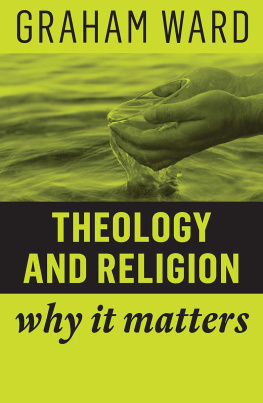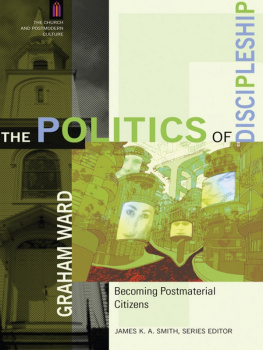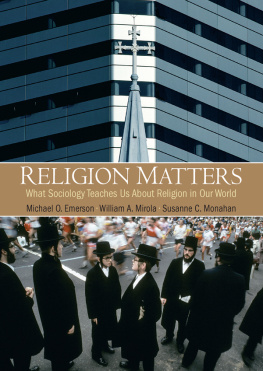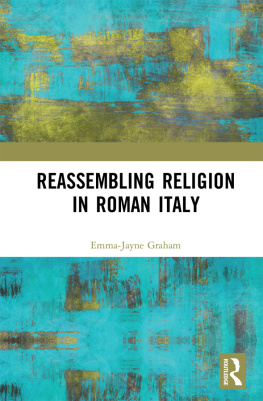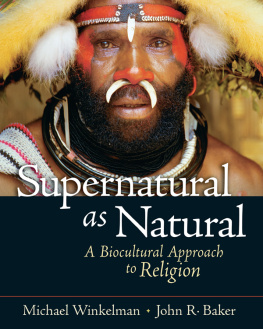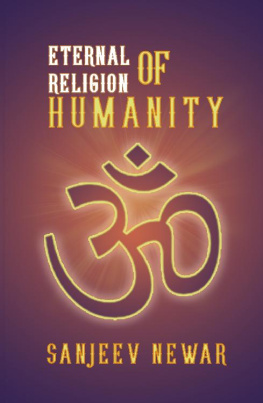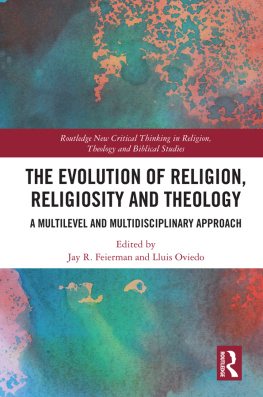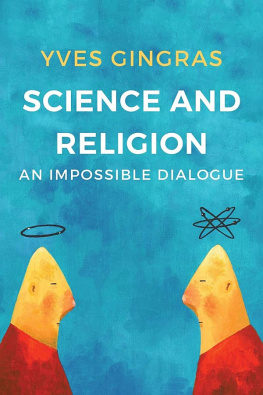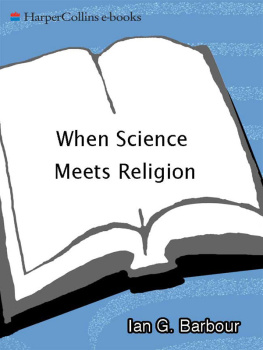CONTENTS
Guide
Pages

Politys Why It Matters series
In these short and lively books, world-leading thinkers make the case for the importance of their subjects and aim to inspire a new generation of students.
Helen Beebee & Michael Rush, Philosophy
Robert Eaglestone, Literature
Lynn Hunt, History
Tim Ingold, Anthropology
Neville Morley, Classics
Alexander B. Murphy, Geography
Geoffrey K. Pullum, Linguistics
Graham Ward, Theology and Religion
Theology and Religion
Why It Matters
Graham Ward
Polity
Copyright Graham Ward 2019
The right of Graham Ward to be identified as Author of this Work has been asserted in accordance with the UK Copyright, Designs and Patents Act 1988.
First published in 2019 by Polity Press
Polity Press
65 Bridge Street
Cambridge CB2 1UR, UK
Polity Press
101 Station Landing
Suite 300
Medford, MA 02155, USA
All rights reserved. Except for the quotation of short passages for the purpose of criticism and review, no part of this publication may be reproduced, stored in a retrieval system or transmitted, in any form or by any means, electronic, mechanical, photocopying, recording or otherwise, without the prior permission of the publisher.
ISBN-13: 978-1-5095-2972-8
A catalogue record for this book is available from the British Library.
Library of Congress Cataloging-in-Publication Data
Names: Ward, Graham, 1955- author.
Title: Theology and religion : why it matters / Graham Ward.
Description: Cambridge, UK ; Medford, MA : Polity Press, 2019. | Series: Why it matters series | Includes bibliographical references and index.
Identifiers: LCCN 2018035724 (print) | LCCN 2018049751 (ebook) | ISBN 9781509529728 (Epub) | ISBN 9781509529698 (hardback) | ISBN 9781509529704 (pbk.)
Subjects: LCSH: Religion--Study and teaching. | Theology--Study and teaching.
Classification: LCC BL41 (ebook) | LCC BL41 .W37 2019 (print) | DDC 200.7--dc23
LC record available at https://lccn.loc.gov/2018035724
The publisher has used its best endeavours to ensure that the URLs for external websites referred to in this book are correct and active at the time of going to press. However, the publisher has no responsibility for the websites and can make no guarantee that a site will remain live or that the content is or will remain appropriate.
Every effort has been made to trace all copyright holders, but if any have been overlooked the publisher will be pleased to include any necessary credits in any subsequent reprint or edition.
For further information on Polity, visit our website: politybooks.com
For Polly Hardman, my grandmother
Acknowledgements
When I was around eight and staying with my grandmother, she took me to town by a different route. Usually we walked to the bus stop. But on this morning she walked me past the greyhound track, where bets were laid on dog-nights on hounds that chased an electronic rabbit, and into Peele Park. From there we could walk along Chapel Street and into the centre of Manchester. At the far end of Peele Park, on a hill, stood the University of Salford. The buildings were in a grand, ornate style, built from the same red brick as most of the Victorian slums around it. I stared up at the monumental sight as she clutched my hand. One day, she said, if you work hard at school, then maybe youll come to a place like this. Although winning a scholarship to continue her education, my grandmother had had to leave school at twelve to help feed and clothe the large number of her younger siblings. The school leaving age rose in 1918, but both my parents also had to leave school at fourteen. So I was the first in my generation to go to university, and the only one of a family of four boys to do so. Later, living with my grandmother, she became the prime force behind my staying on. I owe everything to her for what and where I am today. She saw me go to Cambridge and eventually return to my first Professorial Chair at Manchester (where I lived with her again until her death). I dedicate this book to her memory, and to all those who dream big in deprived conditions.
I would also like to thank the series editor, Pascal Porcheron, for the chance to write this small book and my copy-editor, Justin Dyer, for making my English more accessible and introducing me to the wonderful word septillion.
Introduction
To embark on the study of theology and religion is to undertake an exploration into what we have become and what we are, currently, as human beings. That may sound strange currently but we have evolved through the animal chain and our evolution has not stopped. We may well be on the cusp of becoming a different kind of species altogether as superintelligence and Artificial Intelligence (AI) materialize as well see. But our animal (and even plant) lineages remain. As well also see, there is some discussion at the moment as to whether other animals can be called religious or behave in certain circumstances in ways that might be termed religious. But it is human beings who have developed rites and liturgies. It is human beings who have responded to their experience of the world in ways that form articulated beliefs in the divine, and have developed those beliefs into systems passed down through hundreds of generations. It is human beings who have written the myths, the legends, and collected the ancient wisdoms. They composed the ancient songs, and recorded the testimonies to unprecedented events, deemed to be historical, out of which sacred books and holy Scriptures emerged. These writings have been handed down, copied by scribes in antique libraries, taught, memorized, translated, and disseminated throughout the world. So vital have these texts become, so vivid are the stories, that they compose the bedrock of many of our human civilizations, having an agency of their own well outside the institutions of worship. It is human beings who have built the churches, mosques, and temples, devised the orders of hallowed offices, populated them with priesthoods, and made them bearers of social authority and cultural power. The study of theology and religion is, then, as much a study of what it is to be human as it is a study of what the word God might mean.
This book will explain and illustrate that statement, at a time when the predictions of secularism have floundered and religion is (again) a prominent player in the public realms of every continent in the world bar Antarctica. But perhaps it always was; and always will be. Perhaps those sets of feelings and intimations we call religious are much older than being human and will still exist when our species fossilizes, like so many other Homo species in the past.
So let the journey commence.
The Zagros Mountains are a thousand miles of pleated rock along the edge of Iran, northern Iraq, and southern Turkey. They are often snowcapped and still active glacially. Close to the border with Turkey theres an impressive cave. Tall and wide, its a dark mouth in the rock face visible for miles. The surrounding area is lush, with green valleys, old olive trees, and pastoral farming between sheer cliffs and precipitous gorges. Its a tranquil place, but it has generated a lot of contestation among archaeologists. The Kurdish people who live in the area are no newcomers to warfare. Only the fighting among the archaeologists is not political.
Archaeologists have known of the Shanidar cave since the 1920s though it was .known to local shepherds and had been a shelter in guerrilla warfare far longer than that. Then, in 1957, the skeletal remains of several Neanderthal bodies dating from 35,000 to 65,000 years old were uncovered in an archaeological excavation below what today creates the floor of the cave. One middle-aged man was found in a trench in the rock floor buried in a foetal position with the skeleton of a baby beneath him and the skeletons of two women above him. The arrangement appeared organized around clan relationships, expressive of both life processes and death. There were other burials in the same cave (and later human burials from around 11,000 years ago). The arrangement was not accidental; archaeologists call it intentional, like fire-pits and stone axes.

